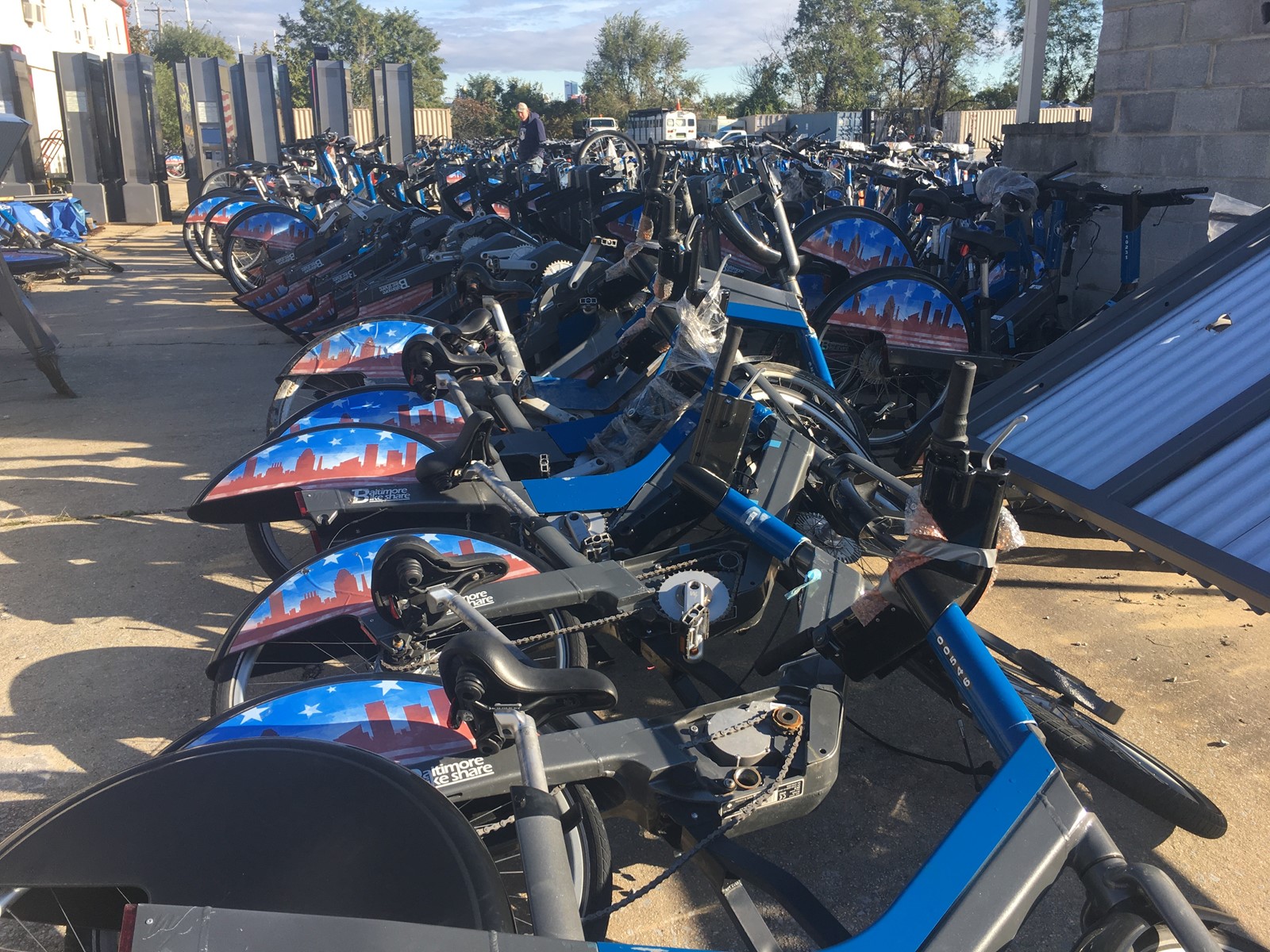How Baltimore Bike Share program came to an angry end
Before shutdown, vendor billed city more than $500,000, records show

As the Baltimore Bike Share system languished earlier this year, the program’s vendor billed the city more than half a million dollars for operational costs “highly beyond the initial level” and also asked the city to write a bulk theft report for more than 100 missing bicycles so it could file an insurance claim.
But the city reminded Bewegen Technologies, the Canadian vendor, in a June 15 letter that its contract limited operating costs to $1,200 per bicycle in service. Furthermore, it said creating a bulk theft report so the company could exceed a $10,000 insurance deductible “would be committing insurance fraud.”
“It is the responsibility of Bewegen to replace the 109 lost bicycles,” city purchasing agent Erin Sher Smyth wrote. “Please provide a timeline for replacement.”
The letter was among more than 900 pages of emails, obtained by The Baltimore Sun through a Maryland Public Information Act request, that provide a behind-the-scenes look at the bike share program’s demise and its eventual replacement with the Bird and Lime scooter pilot agreement.
Among the other findings from the emails and a follow-up interview with city transportation officials:
City Transportation Director Michelle Pourciau said in an interview that the city’s June 15 letter to Bewegen followed a meeting that left both city and company officials unhappy.
“That was the beginning of the reality that we just weren’t going to be able to make it work,” Pourciau said.
Bewegen officials did not respond to calls or emails requesting comment.
‘No bikes again’
Riders weren’t the only ones having difficulty finding a bike this summer. In mid-July, the University of Maryland BioPark asked to end its sponsorship.
On July 13, Nora Finn, director of UM BioPark operations and tenant services, emailed Pourciau, chief of staff Eboni Wimbush and several other city officials that she had been one of the program’s “first and strongest supporters but have lost complete confidence.”
“No bikes again at the UM BioPark!” Finn wrote. “This is a constant. I can no longer defend this program to my leadership team.”
On July 19, Tony Scott, special assistant to the chief of strategic alliances in the mayor’s office, emailed Wimbush: “FYI: We need someone from DOT to provide a response to the University.”
“We don’t want this issue to derail next week’s conversation with Dr. [Jay A.] Perman,” the president of the University of Maryland, Baltimore, he added.
City officials ordered Corps Logistics, Bewegen’s Baltimore-based maintenance subcontractor, to place bikes at the station on July 13, Warfield wrote. Three days later, they visited the bicycle maintenance warehouse in Westport and repeated the instruction, he said, only to be told “bikes were most likely checked out during the time of observation.”
Councilman Eric Costello emailed Warfield Aug. 7 to ask what was going on.
“I am not trying to pound on you here,” he wrote, “but this program has been a total disappointment.”
“I don’t disagree with you,” Warfield responded.
A ‘mutual’ divorce?
Baltimore sent a termination letter to Bewegen less than 24 hours before Mayor Catherine Pugh and Pourciau held a news conference on Aug. 15 announcing the shutdown of the bike share program and introducing the Bird and Lime scooter pilot program to the public.
In its response, Bewegen protested that the city did not provide enough notice to remove all the bikes and stations.
Braunyno Ayotte, Bewegen’s director of business development and marketing, also disputed the language in the initial news release, which said the city “will be ending the current Baltimore Bike Share program.”
That statement, Ayotte said in an Aug. 15 email, “does not represent what was agreed [upon] on our call yesterday.”
“In the spirit of continuing to work in partnership on this matter,” he wrote, “can you please have this changed as per our agreement.”
The city
“We’ve got to sign that divorce paper, but we’re going to pick up the kids and be nice to each other,” she said.
‘Bikeshare is not for them’
Baltimore Bike Share offered a low-cost membership sponsored by the Downtown Partnership to make the program more accessible to all city residents.
On July 9, Philip Barnes, a University of Delaware professor of public policy who was working on a review of several bike share systems’ efforts to serve low-income areas, emailed Bewegen and city transportation officials to ask for a list of “programs/policies/efforts/strategies” Baltimore and its vendor had implemented to address equity concerns.
In his reply on July 18, Warfield said officials were focused on sustaining the struggling system rather than expanding access to it.
T. Chris King, the Baltimore-based marketing adviser whom Bewegen hired around the time of the system’s
“We have spent many months trying to reach underserved communities around Baltimore with little response or interest,” King wrote. “The general consensus seems to be that bikeshare is not for them.”
An equity component of the dockless scooter pilot agreement — urged by Bikemore, the city’s bicycle advocacy group, the emails show — requires Bird and Lime to place a certain percentage of their scooters in low-income neighborhoods each day. It’s unclear whether they’re doing so, because
In the interview, Pourciau said she believes King was incorrect that low-income residents didn’t want bikeshare in their neighborhoods.
“I think there’s appetite everywhere,” she said.


 PREVIOUS ARTICLE
PREVIOUS ARTICLE
